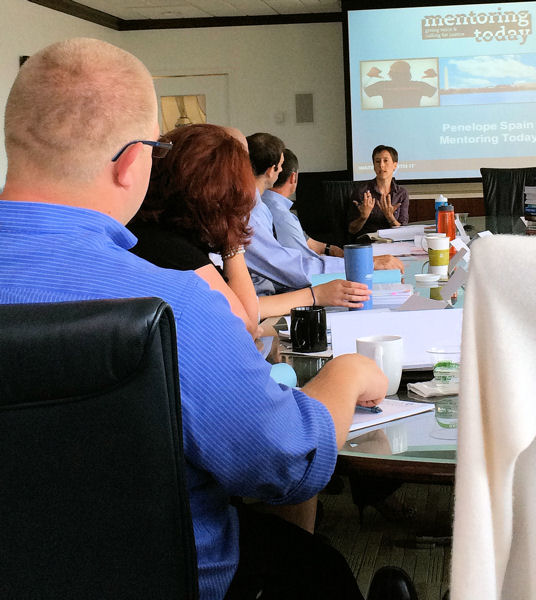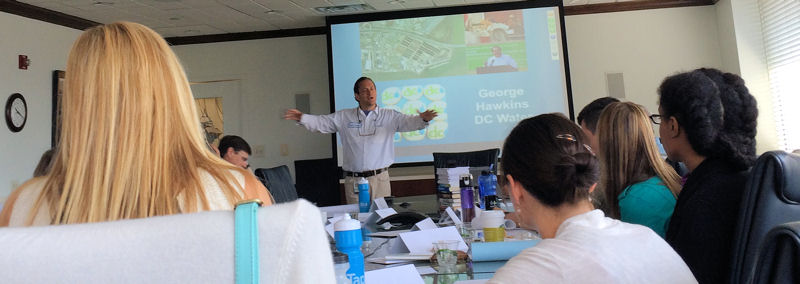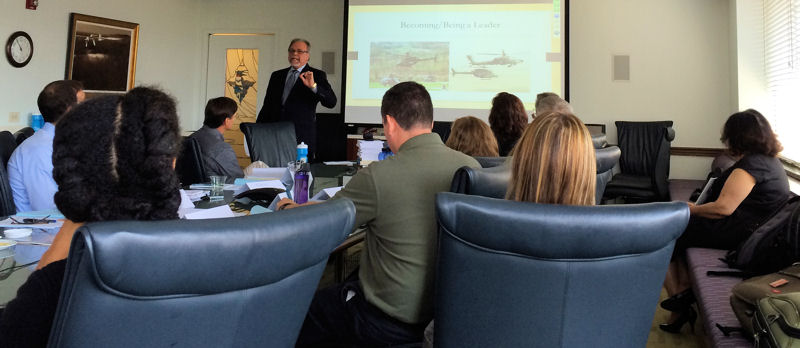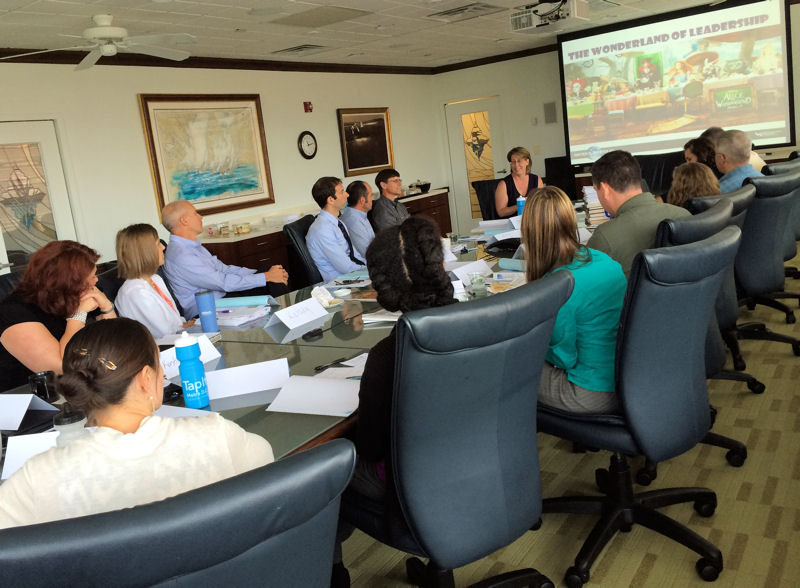
Penelope Spain, chief executive officer and founder of the nonprofit Mentoring Today (Washington, D.C.), discusses how to build relationships with members of the Water Leadership Institute class of 2014. Water Environment Federation (WEF; Alexandria, Va.) photo/Jennifer Fulcher.
The next generation of water sector leaders gathered at Water Environment Federation (WEF; Alexandria, Va.) headquarters on June 17 to learn by example. Four speakers — two from the water sector and two from other sectors — educated members of WEF’s 2014 Water Leadership Institute about the key elements to successful leadership.
Creating a team
Penelope Spain, chief executive officer and founder of the nonprofit Mentoring Today (Washington, D.C.), started the event by discussing the importance of human connections and leading from behind.
“As a leader, we are required to engage with folks all across the spectrum,” Spain said. But everyone shares basic desires to be heard, feel successful, both love and be loved, feel safe, learn new things, and feel useful, she added. Finding similarities and fostering understanding is critical to being a successful leader on all levels, she explained.
Spain started Mentoring Today to connect juvenile detention center youth with law students and help the youth obtain the services they need when released from the centers. The mentored youth and law students start working together by making a list of their similarities to break down barriers.
“To make a list of the things that you share is very powerful,” Spain said. And this can apply to all aspects of leadership, offering a good place to start.
People in leadership positions tend to create an “us‒them dichotomy” that creates division, Spain said. But being curious about those you are leading and “leading from behind” can cultivate loyal employees who feel like members of a team. “Human capital can become a huge asset in the work you are doing,” Spain said.
“The magic of leadership is being able to have a sense of innovation and to cultivate folks underneath you to help carry it out,” Spain said.
“The most important job of a general manager is to get good people, put them in the right place, and let them go,” said George Hawkins, general manager of DC Water (Washington, D.C.) and the second speaker of the day. Seeing teams he helped build later work together to solve problems, innovate, and overcome challenges is extremely rewarding, he said.
Learning about yourself and communicating

During the Water Leadership Institute event, George Hawkins, general manager of DC Water (Washington, D.C.), shared his experiences and recommendations for optimal leadership. WEF photo/Fulcher.
Hawkins shared his experiences and described his career path. With experience serving as a private sector lawyer and a couple of criminal lawyers; working for the U.S. Environmental Protection Agency; serving former Vice President Al Gore; directing the District Department of Environment, New Jersey Future (Trenton), and Stony Brook-Millstone Watershed Association (Pennington, N.J.); and teaching at Princeton (N.J.) University, he has gained many different perspectives.
“I’ve seen the business and professional world from a lot of different angles,” he said.
Having varied experience and gaining different perspectives is something Hawkins recommends to others because it helps leaders make better business decisions as well as cultivate self-realization.
“You need to know yourself,” Hawkins said.
Leaders need to think about what they want to do, where they want to be, and how to get there, he added. Hawkins’ experiences helped him realize his strengths and determine that he wanted to have direct input on decisions, conduct hands-on work, build teams, and communicate the strengths of the water sector.
From all his experiences, Hawkins has realized two things: the importance of the water sector and the importance of communicating your work externally.
“Only one element is fundamental to all life as we know it, and it’s water,” Hawkins said. “You’re in the best bloody industry ever. Who else gets to sell, present, and prepare water; it’s the best product,” he added. Recognizing this and building and communicating this message is a top priority. “If you can’t communicate and build a message for what you’re doing, nothing else matters,” he said.

Christo Sedor, senior service architect at CA Technologies (New York), described the importance of helping others and learning how to communicate with different personalities. WEF photo/Fulcher.
Christo Sedor, senior service architect at CA Technologies (New York) and another speaker at the Water Leadership Institute event, also described the importance of learning how to communicate with different personalities as a leader. He noted that the most important role for leaders is to help others succeed.
“Success is all about growing others,” Sedor said.
Karen Pallansch, chief executive officer of Alexandria (Va.) Renew Enterprises, took the floor for an extensive review of leadership qualities, reaffirming the importance of collaborating, building teams and recognizing achievements, being self-aware, learning from others, and learning how to effectively communicate internally and externally.
“When you are a leader, it really is about the relationships and constantly managing up, down, and laterally,” Pallansch said.
Developing a vision and stepping into the role of a leader
Pallansch explained that leadership revolves around giving direction and making a plan. But leaders also have to be managers and make this vision into a reality by getting tasks done. “You serve something greater than yourself,” she said.

The Water Leadership Institute Class of 2014 received a review of leadership qualities from Karen Pallansch, chief executive officer of Alexandria (Va.) Renew Enterprises. WEF photo/Fulcher.
A key element is having both an open and broad mind where you actively listen to others, communicate accurately, are flexible, set priorities, and make timely decisions, Pallansch said. Visionary people take initiative, learn from others, and come up with solutions that break down barriers, she added.
“The twenty most powerful words in leadership: while working in a team or group environment, I will place the interests of the enterprise ahead of my own,” she said.
The only way to succeed as a leader is if your organization thrives. “There isn’t a perfect leader, each one of us is unique,” Pallansch said. “It’s what you do with who you are that really matters … don’t ever stop believing in yourselves, in your organization, in our profession.”
— Jennifer Fulcher, WEF Highlights
 A total of 28 professionals have been chosen as members of the Water Leadership Institute class of 2014. The program, launched in 2012, was developed by the Water Environment Federation (Alexandria, Va.) to help future water sector leaders develop new skills and gain knowledge needed to take on sector challenges.
A total of 28 professionals have been chosen as members of the Water Leadership Institute class of 2014. The program, launched in 2012, was developed by the Water Environment Federation (Alexandria, Va.) to help future water sector leaders develop new skills and gain knowledge needed to take on sector challenges.
Monthly webcast training, work group activities, discussion group sessions, readings, and responses educate participants about various water industry topics, such as trends in the water sector, leadership and communication challenges and strategies, finance and business, innovations, and the utility of the future. Members of the Class of 2014 will participate in a final workshop and graduation ceremony during WEFTEC® 2014 in New Orleans.
WEF soon will begin accepting applications from those interested in becoming members of the Class of 2015. Applications are due by Jan. 31.
Water Leadership Institute Equips Next Generation with Leadership Skills |








August 28, 2014
Featured, WEF Resources & Efforts